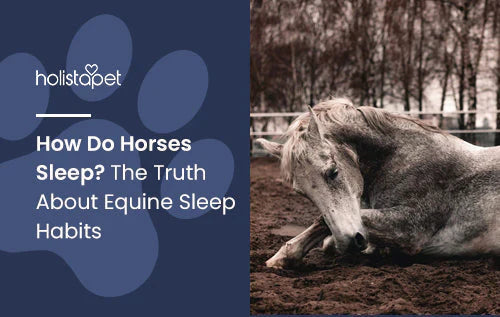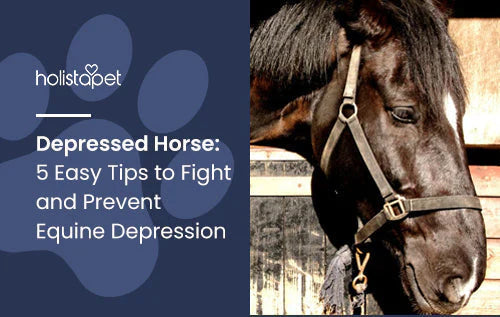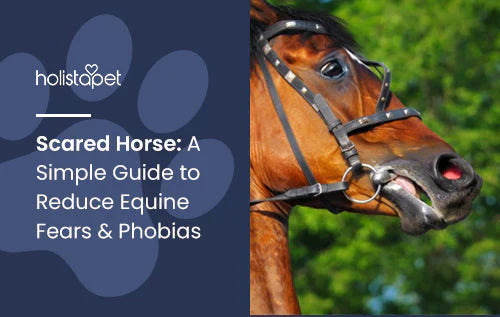If you ask a random person, "how do horses sleep?" they may give an answer that many of us learned as children: Horses sleep on all four hooves! The myth that horses can sleep standing up isn't entirely wrong, and this article will explain why. To understand how horses get their shut-eye, we must examine REM sleep and the psychology of prey species.
Learning how these animals doze can help you provide the best care and sleeping area for your equine. Pour yourself a warm glass of milk and put on some pajamas as we explore how horses sleep!
Horse Sleeping Habits: How Do Horses Sleep on their Side?
Can horses sleep on their side? An equine sleeps differently from a human. While most of us stay awake for roughly 16 hours in a day, followed by eight hours of sleep, horses prefer frequent naps. In the wild, horses alternate between grazing, napping, running with the herd, getting some deep sleep, and starting the process over again.
Horses prefer to doze in shifts, with one or a few herd members standing guard while the rest lie down. A horse will lie on its side to sleep, assuming the same position that they take when playing dead on movie sets. Horses lie on their side to get rapid-eye-movement (REM) sleep, which differs from a nap.
Non-equestrians often don't see horses in such a vulnerable position because they only sleep for three hours total each day. Some of this time may be spent lying on its side or on its feet. A combination of these positions is beneficial for the horse's mental, hoof, and joint health. Horses can even "talk" in their sleep. They may grunt or nicker (a closed-mouth vibration), though this is far more likely in deep sleep than light napping. It's perfectly normal behavior and suggests that they may be dreaming!
Why Do Horses Sleep Standing Up?
Being a prey animal means a horse has to have the ability to escape a predator at any moment. Every second counts in these life-or-death moments, and a horse would waste valuable time getting to its feet. This is why horses have the ability to sleep on their feet, though they don't get deep sleep on all fours.
While horses can nap in an upright position, they cannot get necessary REM sleep without lying down. A horse can sleep on its feet using a complex system of joints, muscles, sinews, and ligaments called the stay apparatus. The stay apparatus is common in animals that are both large and hunted.
The stay apparatus allows a horse to lock its large joints. This system means they don't exert the same muscle strain humans would if we tried spending the night on our feet. Still, horses usually keep one foot off the ground (often hind legs) to relax one limb at a time.
Locking their joints lets horses immediately run away from a predator upon waking. When they lie down for deeper sleep, they prefer to do so under the watchful protection of a herd member. Since horses only spend three hours of the day sleeping, they minimize time spent exposed to predators.

What is Normal vs. Excessive Sleep for Horses?
If a horse sleeps more than a few hours a day, it may not be excessive, depending on its age. Foals usually spend half their days snoozing, gradually adjusting to an upright rest position as they grow older. By the time your foal is three months old, it should start to sleep less than half the day.
An adult horse spends most of its downtime standing, only lying down for REM sleep. The "three hours per day" rule only applies to deep sleep, not naps. How often the animal dozes off on all-fours depends on each horse, though it is often a frequent occurrence throughout the day and night.
An animal's prey instinct is hard to overcome, and an equine won't allow itself to get some shut-eye until it feels secure. If your horse is repeatedly sleeping in intervals longer than 15 minutes, it may not feel safe enough to let its guard down. Try giving your horse a variety of environments to see which one helps them feel safe enough to fall asleep.
Intimidating animals, other aggressive horses, noisy places, and personal preferences are important variables for a horse's comfort. It should not feel threatened or overstimulated in its environment. A stabled horse might be used to its stall, and a wild horse will likely prefer to stay in the field overnight.
The Importance of Deep Sleep for Horses
Rapid eye movement (REM) is one of the most important sleep stages for humans, and research has shown that it is equally crucial for horses. REM sleep impacts how a horse's brain learns new information, forms memories, and follows commands. Also called deep sleep, REM is a fairly mysterious phenomenon that we don't fully understand, even in human studies. REM sleep has been found in every mammal and bird's sleep patterns. It gets its name from the rapid movements the eyes make while animals are in this sleep stage.
During this phase, brain activity skyrockets though the body is still unconscious. This has earned the REM stage another name: paradoxical sleep. Whatever the brain is up to in this phase, we know it is crucial because of the adverse effects of missing REM sleep. It is more likely for a horse's overall health to suffer if it does not receive enough deep sleep. Even if the equine gets plenty of rest standing on all fours, it needs those three critical hours of deep sleep for its well-being.

Why Do Horses Need to Sleep Well?
Ideally, horses should be able to roam in a large, open area, sleeping whenever they want. Of course, this isn't an option for every owner. Fortunately, there are still plenty of ways your horse can get a healthy snooze in a stall. Horses won't lie down in an area that is too small. If they don't have the ability to stand back up quickly, they could see the space as too dangerous to let their guard down. Spend some time near your horse the first week it's in its stall, ensuring they're equally comfortable lying down and standing.
Horses typically prefer to face the exit point of their stall. If their rear-end is facing the door, they could grow anxious and refuse to sleep. Additionally, horses enjoy the same amount of darkness and silence that humans do when sleeping. Make sure you turn off stable lights at the end of the day just like you would in your own house. A horse will need plenty of bedding on the stable floor. This is not only for its comfort but also for insulation and absorbency (horses also have to pee in the middle of the night). We advise six to eight inches of straw bedding.
RELATED: WHY DO HORSES NEED SHOES?
Can CBD Help Horses Sleep?
Absolutely! Cannabidiol (CBD) is a hemp-derived compound bursting with benefits for people and animals. CBD boosts the animal's endocannabinoid system (ECS), which regulates essential body functions. A horse is more likely to lie down for a great night's sleep with a healthy ECS.
Cannabidiol promotes soothing feelings that calm your horse's mind. Animals are frequently exposed to new situations, and this can be frightening since they often don't understand what's going on. For example, a horse can feel very uneasy moving to a new home it's never seen before. Some CBD pellets, combined with your reassurance, can ease a scared horse into a more relaxed state and make the transition easier.
CBD horse pellets or oil is an excellent way to provide cannabidiol benefits to your steed. The best CBD for pets comes from HolistaPet. We use all-natural, organic ingredients Our hemp is locally sourced from Oregon and Colorado, the best states for these crops. Plus, we send all our products to a third-party lab to test their purity and effectiveness, ensuring it's of premier quality.
Final Thoughts
Well, now you know some of the truth behind how a horse sleeps! Whether they lock their muscles or spend some time lying down to catch a few winks, we can drastically improve a horse's sleep quality. They might experience skittishness in unfamiliar, cramped, or unsafe surroundings, but now we know how to help them. Horses are capable of many incredible things, and their abilities increase when they're well-rested!







![Probiotics For Dogs [Soft Chews] - HolistaPet](http://www.holistapet.com/cdn/shop/files/Probiotic-Infographic-1_472d7a29-e30c-435a-9638-1365d8c3a9f9.jpg?v=1725384841&width=104)


























Leave a comment
All comments are moderated before being published.
This site is protected by hCaptcha and the hCaptcha Privacy Policy and Terms of Service apply.